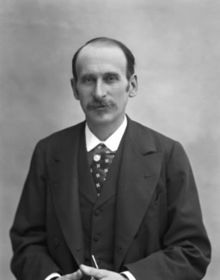Godefroy Cavaignac
Jacques Marie Eugène Godefroy Cavaignac (born May 21, 1853 in Paris , † September 24, 1905 in Flée ) was a French politician.
Cavaignac was first elected to the Chamber of Deputies of the Third French Republic in 1882 . In 1885 he was State Secretary in the War Ministry. In 1898, at the height of the Dreyfus affair , he was briefly Minister of War. Cavaignac was one of those people who were firmly convinced of the guilt of the Jewish artillery captain Alfred Dreyfus . Dreyfus was found guilty of treason in late 1894. The conviction was based on dubious manuscript reviews and unlawful evidence. Since Dreyfus was convicted, more and more people were convinced that the conviction was a miscarriage of justice. Shortly after taking office, Cavaignac reassured the Chamber of Deputies that he was convinced that Dreyfus was lawfully convicted. As evidence of the lawful conviction, he cited, among other things, Le faux Henry , the Cette canaille de D. letter and another letter from the Italian military attaché Alessandro Panizzardi.
The Socialist MP Jean Jaurès , a staunch Dreyfusard, then challenged the Minister of War in an open letter and announced that he would refute Cavaignac's argument point by point. He did so in a series of articles that appeared in La Petite République in August and September 1898 . The central point of his argument was the claim that Le faux henry was a forgery fabricated by the General Staff. This led to a re-examination of the evidence, some of which was done by lamplight. Captain Louis Cuignet, one of Cavaignac's assistants, noticed the two different types of paper that made up Le faux henry . Together with General Roget, he agreed that it was indeed a forgery, as the dismissed head of the intelligence service, Marie-Georges Picquart , had previously claimed.
Cavaignac was informed of this on August 14, but it was not until August 30 that Cavaignac questioned General Staff Officer Hubert Henry in the presence of Generals Raoul Le Mouton de Boisdeffre and Charles Arthur Gonse about the find. Henry first tried to deny it, but then admitted under the pressure of questioning that he had forged the letter. He was arrested and taken to the Mont Valérien military prison. In a brief publication, the government announced that the counterfeit of the faux henry had been discovered. On August 31, Henry committed suicide by slitting his throat with his razor. Boisdeffre resigned after Henry's suicide, Gonse was transferred to active duty by the General Staff and du Paty retired. Esterhazy, who had since fled to Belgium, admitted in press interviews that he had written the bordereau. On September 3, Lucie Dreyfus filed another appeal for a revision, and the politically neutral press now also called for the trial to be restarted. On September 5, Cavaignac resigned as Minister of War.
Even after his resignation, Cavaignac remained a staunch anti-Dreyfusard and opposed a new trial against Dreyfus. The Supreme Court of Appeal decided towards the end of 1898, however, and in 1899 there was a second court martial in which the judging military judges found Alfred Dreyfus guilty of treason a second time, despite the different evidence. Due to the change of government that had taken place in the meantime, however, there were enough advocates in the new cabinet for a pardon for Dreyfus. Dreyfus was not fully rehabilitated until 1906, a year after Cavaignac's death.
The historian Eugène Cavaignac was his son.
literature
- Maurice Barrès : Scènes et doctrines du nationalisme . Éditions du Trident, Paris 1987, ISBN 2-87690-040-8 .
- Louis Begley : The Dreyfus Case: Devil's Island, Guantánamo, History's Nightmare. Suhrkamp, Frankfurt 2009, ISBN 978-3-518-42062-1 .
- Jean-Denis Bredin: The Affair: The Case of Alfred Dreyfus. George Braziller, New York 1986, ISBN 0-8076-1109-3 .
- Ruth Harris: The Man on Devil's Island - Alfred Dreyfus and the Affair that divided France. Penguin Books, London 2011, ISBN 978-0-141-01477-7 .
- George Whyte : The Dreyfus Affair. The power of prejudice. Peter Lang, Frankfurt am Main 2010, ISBN 978-3-631-60218-8 .
Individual evidence
- ↑ Begley, pp. 159-160
- ^ Harris, p. 136
- ^ Harris, p. 136 and p. 257
- ↑ Begley, pp. 160-161
- ^ Harris, p. 257
| personal data | |
|---|---|
| SURNAME | Cavaignac, Godefroy |
| BRIEF DESCRIPTION | French politician |
| DATE OF BIRTH | May 21, 1853 |
| PLACE OF BIRTH | Paris |
| DATE OF DEATH | September 24, 1905 |
| Place of death | Flée |
